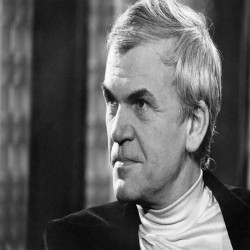
Milan Kundera
Czech-French Novelist
| Date of Birth | : | 01 Apr, 1929 |
| Date of Death | : | 11 Jul, 2023 |
| Place of Birth | : | Brno, Czechia |
| Profession | : | Novelist, Author, Poet |
| Nationality | : | French, Czech |
Milan Kundera was a Czech and French Novelist. Kundera went into exile in France in 1975, acquiring citizenship in 1981. His Czechoslovak citizenship was revoked in 1979, but he was granted Czech citizenship in 2019. Kundera's best-known work is The Unbearable Lightness of Being.
Biography
The son of a noted concert pianist and musicologist, Ludvik Kundera, the young Kundera studied music but gradually turned to writing, and he began teaching literature at the Academy of Music and Dramatic Arts in Prague in 1952. He published several collections of poetry in the 1950s, including Poslední máj (1955; “The Last May”), an homage to the Communist resistance leader Julius Fučík, and Monology (1957; “Monologues”), a volume of love poems that, because of their ironic tone and eroticism, were later condemned by the Czech political authorities. During his early career he moved in and out of the Communist Party: he joined in 1948, was expelled in 1950, and was readmitted in 1956, remaining a member until 1970. According to an article published in 2008 in a Czech magazine, Kundera in 1950, after his expulsion from the party, informed police in Prague of the presence of a Western intelligence agent, who was then arrested and imprisoned for 14 years. Kundera denied the article’s claims, which were based on a researcher’s discovery of a police report on the arrest.
Several volumes of short stories and a highly successful one-act play, Majitelé klíčů (1962; “The Owners of the Keys”), were followed by his first novel and one of his greatest works, Žert (1967; The Joke), a comic, ironic view of the private lives and destinies of various Czechs during the years of Stalinism; translated into several languages, it achieved great international acclaim. His second novel, Život je jinde (1969; Life Is Elsewhere), about a hapless, romantic-minded hero who thoroughly embraces the Communist takeover of 1948, was forbidden Czech publication. Kundera had participated in the brief but heady liberalization of Czechoslovakia in 1967–68, and after the Soviet occupation of the country he refused to admit his political errors and consequently was attacked by the authorities, who banned all his works, fired him from his teaching positions, and ousted him from the Communist Party.
In 1975 Kundera was allowed to emigrate (with his wife, Věra Hrabánková) from Czechoslovakia to teach at the University of Rennes (1975–78) in France; in 1979 the Czech government stripped him of his citizenship. In the 1970s and ’80s his novels, including Valčík na rozloučenou (1976; “Farewell Waltz”; Eng. trans. The Farewell Party), Kniha smíchu a zapomnění (1979; The Book of Laughter and Forgetting), and Nesnesitelná lehkost bytí (1984; The Unbearable Lightness of Being), were published in France and elsewhere abroad but until 1989 were banned in his homeland. The Book of Laughter and Forgetting, one of his most successful works, is a series of wittily ironic meditations on the modern state’s tendency to deny and obliterate human memory and historical truth. Nesmrtelnost (1990; Immortality) explores the nature of artistic creation. Kundera began writing in French with La Lenteur (1994; Slowness), followed by L’Identité (1997; Identity); La ignorancia (2000; Ignorance), a story about Czech émigrés written in French but first published in Spanish; and La fête de l’insignifiance (2013; The Festival of Insignificance), about a group of Parisian friends.
Kundera’s wide-ranging reflections appear in L’Art du roman (1986; The Art of the Novel), Les Testaments trahis (1993; Testaments Betrayed), Le Rideau (2005; The Curtain), and Une Rencontre (2009; Encounter).
Quotes
Total 20 Quotes
The first step in liquidating a people is to erase its memory. Destroy its books, its culture, its history. Then have somebody write new books, manufacture a new culture, invent a new history. Before long that nation will begin to forget what it is and what it was... The struggle of man against power is the struggle of memory against forgetting.
The man hunched over his motorcycle can focus only on the present... he is caught in a fragment of time cut off from both the past and the future... he has no fear, because the source of fear is in the future, and a person freed of the future has nothing to fear.
The worst thing is not that the world is unfree, but that people have unlearned their liberty.
The stupidity of people comes from having an answer for everything. The wisdom of the novel comes from having a question for everything.
When the heart speaks, the mind finds it indecent to object.
The only reason people want to be masters of the future is to change the past.
To sit with a dog on a hillside on a glorious afternoon is to be back in Eden, where doing nothing was not boring - it was peace.
People are always shouting they want to create a better future. It's not true. The future is an apathetic void of no interest to anyone. The past is full of life, eager to irritate us, provoke and insult us, tempt us to destroy or repaint it. The only reason people want to be masters of the future is to change the past.
There is a certain part of all of us that lives outside of time. Perhaps we become aware of our age only at exceptional moments and most of the time we are ageless.
The Greek word for "return" is nostos. Algos means "suffering." So nostalgia is the suffering caused by an unappeased yearning to return.
